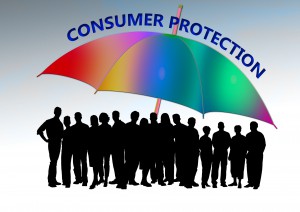Every time you buy something, you are considered a consumer. The noun consumerism refers to the idea that spending money and consuming goods is good for our economy. Because you are willing to spend money on goods and services, businesses are able to produce items, people are able to have jobs, money is able to flow, and our economy expands.
As the world’s economy grows, each person is involved in more, and bigger, transactions, and so the rights and responsibilities of being a well-educated consumer are more important now than ever before.
What are Consumers?
If you buy something and use it, you are a consumer. If you make and sell something, you are a producer. Of course, most people are both – working as producers and buying as consumers. Just like businesses have certain responsibilities and practices they need to keep in mind, consumers have responsibilities in order to make sure they are not being taken advantage of. In the United States, every consumer has certain rights to ensure they get a fair deal. The most fundamental consumer right is the right to complain. This may not sound important, but it can have a much bigger impact than you would expect.
Consumer Rights
Implied Rights

An implied warranty means that when a company sells a product, they are selling a product that is defect-free. If you take it home only to find it does not work, you have the right to go back to the store and ask for a replacement. Unless the product comes with a warranty, the store may not be obligated to give you a free replacement, but generally speaking, businesses prefer to keep their customers happy, so it is likely they will exchange your item for you.
Most front-line employees have a set of guidelines to follow as they work with customers who have product quality or service issues. If you feel your issue is not being taken seriously as you talk with a lower level employee, you can always ask to speak to a higher level employee, such as the salesperson who worked with you or a manager. If you can demonstrate that the business willingly sold you something broken or defective, the sale may be considered fraud. Fraudulent business practices have their own set of consequences and regulations, so definitely report issues to the Better Business Bureau or the Federal Trade Commission.
You also have the right to leave negative feedback and reviews on review websites. Share your honest thoughts about your experience or purchase, but be professional and not offensive with your review. Again, this might seem like a small consolation, but companies (especially those doing business online) rely heavily on positive customer reviews, so speaking up can end up having a larger impact.
Explicit Rights
Explicit rights are the rights which are guaranteed through a contract or by law.
Warranty
Beside the implied warranty that comes with a product purchase, many products also come with an explicit warranty. This warranty is usually written and includes information about how any product or service defects will be handled by the manufacturer or the retailer in the event that the product does not function as originally described or intended. Most often if you experience a product issue, you will be asked to show proof of purchase (the original receipt). Then the business will repair or replace the defective item. In today’s electronic age, your sales receipt may include the warranty information, or the information sheet accompanying the product will provide instructions about the terms of the warranty. If you have a warranty, along with a proof-of-purchase (including a receipt), you may be able to explicitly request the seller fulfill the terms of the warranty by offering repair or replacement. If they refuse, you have further legal right to sue in a small-claims court.
Legal Obligations
Several types of purchases have even more consumer protections by law. These include:
- Car Sales – These protections differ for each state, so check with your state’s consumer protection office to find out your explicit protections.
- Phone, Television, and Other Utilities – Public utilities have strict regulations over billing and service requirements. If you think that your utility provider is not fulfilling their obligations, you can contact your local franchising authority, the FCC, or even the Public Utility Commission.
- Banks and Lending Institutions– The banking industry likely has the strongest consumer protections in the United States, governed by several authorities. If you have a consumer dispute with a bank that cannot be handled by simply talking with the manager, visit the USA.gov resource center for more options.
- Airports – Each person has certain rights when travelling, including protections against discrimination, safety, and security at an airport. After you reach your destination, there are further protections for hotel stays. For example, if you get bed bugs, you may be entitled to compensation. Like banks, hotel regulations differ by state, so visit the USA.gov resource center for more information.
- Housing – Each person has many rights to housing, at every level of government (local, state, and federal). This includes protection from discrimination, and in some cases controls on how high the rent can be raised per year.
If you believe you have a consumer complaint, the most important documents you need will be your receipts. Generally speaking, regulatory agencies require you to try to resolve any issue directly with the business before they get involved, so you should send the business your complaint in writing before trying to get additional help.
If you do need help with your consumer complaint, the best places to start are the Consumer Complains Resource Center at USA.gov and the Better Business Bureau.
Consumer Responsibilities

Consumers do not have a large number of implied protections. This is, in part, because business law is centered on the “reasonable person“ standard. This standard focuses on the idea of “what would a reasonable person do in this same situation?” Consumers are expected to put some thought into each purchase to make sure it is what they really want to do. If a consumer spends $9,000 on an iPhone game (which a consumer reported in 2015) before realizing how much money he was losing, he will not have many legal protections (unless he can demonstrate that the game was fraudulent in some way). Consumer protections are not designed to prevent consumers from making bad decisions. It is the duty of every consumer to make rational, reasonable choices when choosing their consumption. The easiest way to do this is to build a spending plan and stick with it.
One final thought: To make sure you have all the tools you need to file a complaint if you need to, always keep detailed financial records.

Get PersonalFinanceLab
This lesson is part of the PersonalFinanceLab curriculum library. Schools with a PersonalFinanceLab.com site license can get this lesson, plus our full library of 300 others, along with our budgeting game, stock game, and automatically-graded assessments for their classroom - complete with LMS integration and rostering support!
Learn More[qsm quiz=72]
Challenge Questions
- Using examples, explain what a consumer is.
- How is a warranty both beneficial for the manufacturer and the consumer?
- List 5 consumer “watchdog” organizations that have been set up to protect consumers?
- Have you every bought a product that was faulty? If so, what were you able to do?

 Teacher Introduction Webinars
Teacher Introduction Webinars 14 – Week Financial Basics
14 – Week Financial Basics Financial Records
Financial Records